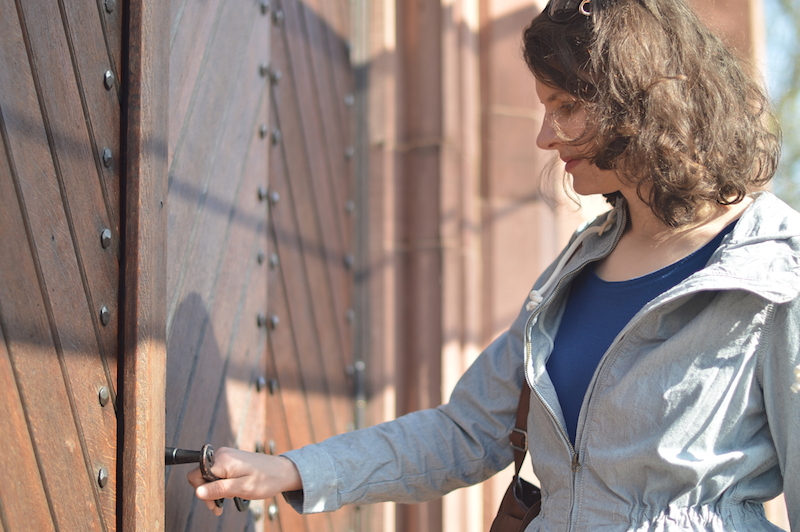Suffering can be unspeakably isolating. It can feel pointless and drive us toward depression. Depression, in turn, can drive us toward despair. And despair often keeps us from corporate worship.
Two years after my husband’s passing, the merciless cascade of grief tempted me to skip church. One Sunday I almost didn’t go because I couldn’t stop crying. Then I remembered it was communion Sunday, something my pastor called a means of grace.
The possibility of grace nagged at me until I got out of bed and looked in the mirror. My swollen eyelids told me I could use all the grace I could get. I put on little concealer, a clean shirt, a whole lot of hairspray, and went to church, 10 minutes late.
Where Do Unhealthy People Sit?

I stood at the entrance scanning the inside of the sanctuary. Slipping into the service proved harder than I thought. Every pew filled, a symptom of a healthy church. Where do the unhealthy sit? A deacon smiled and pointed me to the balcony.
Reaching the top of the stairs, the view took my breath away. Hundreds were singing. An organ thundered along with brass instruments. Perhaps if you took that moment and injected it with steroids, you might have the view from heaven. It was the view my husband enjoyed.
Two years now and I should be well over it, getting on with my life, and all the other clichés that have turned out to be myths. We have—well, I mean, I have—been a member here for 28 years. I know most faces up here. A divorced man who would slip in late and leave early. Another who battled depression. An elderly couple in failing health. Here we all sat—the invisible church, broken beyond any human’s ability to fix us.
Greater Clarity
Anyone focused on their suffering feels the same. Corporate worship can remind us that Christ died for those pains—which are never beyond his reach. Peter writes, “But to the degree that you share the sufferings of Christ, keep on rejoicing” (1 Pet. 4:13). I did my best to keep on. I looked toward the third row from the front, the old spot where my husband and I sat. Drowning in self-pity, I considered my losses. A husband to a premature death. A family shattered by the loss of its head. Friends who avoided me because they didn’t know what to say. My role as an elder’s wife—feeling useful among God’s people.
“Open your Bibles to Philippians, chapter two,” our pastor said. I listened again to the words of Paul, who wrote of Christ’s losses—“he emptied himself, born in the likeness of men . . . he humbled himself . . . and became obedient to the point of death, even death on a cross.”
Christ’s sufferings now resonated with greater clarity because of my own. He alone understands my pain. When my pain makes others scatter, he draws near.
Precious in His Eyes
My pastor lifted his hands and prayed, “Father, we are grateful for our union with Christ, by which you are able to rejoice over us with singing and quiet us with your love. Would you lift up every burden, every fear, every anxiety, that they might be filled with the loving kindness and joy of Christ their Savior?”
My heart fought against those prayers. He read the words of Isaiah 43:
When you pass through the waters, I will be with you; and through the rivers, they shall not overwhelm you; when you walk through fire you shall not be burned and the flame shall not consume you. . . . Because you are precious in my eyes, and honored, and I love you.
The passage pierced through my self-focus. “I will be with you because I love you.” Those words washed over me. Christ voluntarily entered into my suffering—bearing my pains—even the most inconsolable ones. I am in Christ, and he is in me. I tasted only a morsel of the cost, but he endured the full penalty.
Elders made their way down front, one man less. Tears streamed down my face. Grief declared war on me even at the Lord’s table. Especially then. Communion is why I came. Jim’s friend stood in front of me, extending a silver plate of saltines. Exactly how does this translate into grace? There’s nothing special about saltines and grape juice until it’s called communion—a glorious reminder of “God with us.” Communion reminds us we are bound to Christ, and he to us.
Come Empty-Handed
Some say you can worship God at home, but how likely are you to be filled with more of Christ when you’re empty and alone? Eventually, you would worship the god of your own making and drown in self-absorption.
Sin and suffering can make us want to run and hide from God, like Adam and Eve. And they eventually hid from one another, too. Can we not relate? What makes us think we have to have it together to come to church? What would the church look like if we lost our self-focus and fully gazed on Christ? The bread, his body, the cup, his blood, shared by faith in the presence of other wounded believers is a portrait of redemption, which makes everything sad come untrue. As Christ’s suffering unites us to him, it also binds us to one another. True healing, whatever your scars, isn’t accomplished in isolation. And whatever your scars, they are temporary pains.
In The Return of the King, Sam and Frodo must pass through the dark land of Shadow. Exhausted and shattered, Sam looks up:
There, peeping among the cloud-wrack above a dark tor high up in the mountains, Sam saw a white star twinkle for a while. The beauty of it smote his heart, as he looked up out of the forsaken land, and hope returned to him. For like a shaft, clear and cold, the thought pierced him that in the end the Shadow was only a small and passing thing: there was light and high beauty forever beyond its reach.
Our anguish, though deep enough to last a lifetime, is only a passing thing. Cease your striving and come empty-handed to church—that Jesus may remind you of your union with him, and with his body, and may fill your heart with joy.
Is there enough evidence for us to believe the Gospels?
 In an age of faith deconstruction and skepticism about the Bible’s authority, it’s common to hear claims that the Gospels are unreliable propaganda. And if the Gospels are shown to be historically unreliable, the whole foundation of Christianity begins to crumble.
In an age of faith deconstruction and skepticism about the Bible’s authority, it’s common to hear claims that the Gospels are unreliable propaganda. And if the Gospels are shown to be historically unreliable, the whole foundation of Christianity begins to crumble.



































